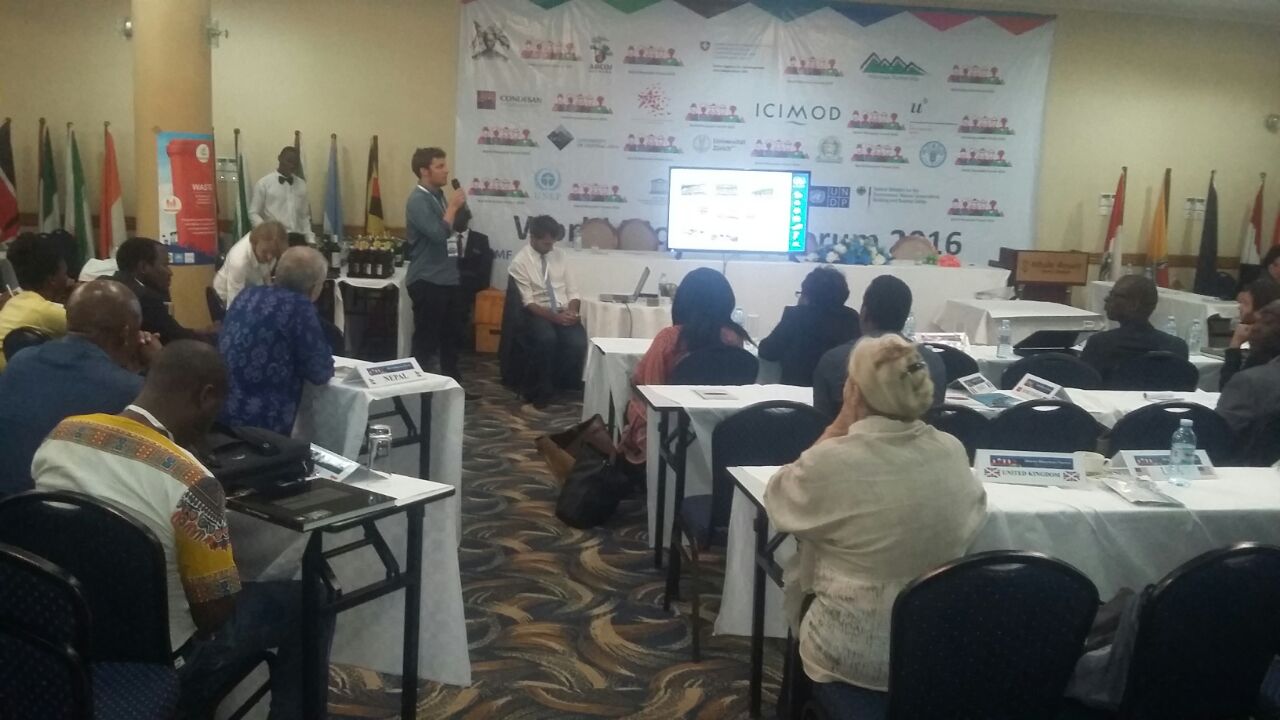

In a refreshing side event to the WMF 2016, UNEP and partners presented the preliminary findings of the Waste Management Outlook (WMO) for mountain regions, a publication that will be launched on this year’s World Mountain Day (11 December 2016). The event which was aptly named “waste(ing) mountains” allowed participants to reflect on the serious problem posed by the increasing amount of waste in mountains as these areas continue to get urbanized and mountain tourism continue to flourish. Solid waste management in mountain regions is faced with specific challenges that are non-existent in lowland settlements. In fact, the physical characteristics of mountains that include steep slopes and ruggedness, coupled with socio-economic attributes of mountain regions such as poor infrastructure and scarce financial resources; make difficult the task of collecting, managing and disposing of growing amounts of waste. During one of the sessions of the WMF 2016, a remark was made on the importance of increasing and enhancing ecotourism in mountains as a way to promote Sustainable Mountain Development (SMD). This initiative thus sheds a glaring light on the challenges that SMD stakeholders have to face to truly make mountain become pillars of sustainable development. One of the key findings of the outlook is the fact that almost all solid waste in mountains is disposed through burning and dumping. For instance, in Nepal, it was found that 50% of the waste is dumped and 40% is burned while only 10% is the amount of waste recycled. Burning waste at high altitudes such as those that characterize mountain regions poses a big pollution risk since the pollutants find it easier to catch the high altitude winds thus spreading further. Dumping also comes with its own risks since the steep slopes in mountains facilitate the travel of the dumped waste into streams thus polluting water supply downstream. “Oceans have caught all of the attention when it comes to analysing the effects of waste on ecosystems including their impact on the food chains. Similar knowledge on mountains is still scanty to say the least…and this is an urgent issue to address in order to achieve true Sustainable Mountain Development” – Bjorn Alfthan, UNEP Grid Arendal. During the lively and very interactive discussion that followed the few presentations that comprised the event, participants noted with concern the alarming scale of littering that is happening in mountains. They related many captivating personal stories of cases where mountain ecosystems are being literally wasted in the name of tourism and pilgrimage. Even more glaring was the dilemma that this issue entails since the tourism industry is the very sector that SMD stakeholders are pushing as a catalyser of development in mountain regions. As a proposed solution, it was emphasized that clear action should be taken to regulate waste generation in mountains and this action should be backed by sound waste management policies and strategies at both national and sub-regional levels. Indeed, good examples such as Rwanda’s successful crack on plastic bags were applauded and other countries were called upon to follow suite. UNEP was also found to be well strategically positioned and therefore called upon to catalyse the formulation of adequate policies that will set an adequate framework for this required action.
During the celebration of the International Mountain Day at Paris, 11 December, the UN Environment Programme (UNEP) concludes a series of Mountain Adaptation Outlooks. By promoting policies in favour of ecosystem-based adaptation in mountain regions,
To mark World Environment Day 2016, The International Centre for Integrated Mountain Development (ICIMOD) has launched the ICT for Mountain Development Award 2016. This award which is being issued for its third consecutive year recognizes innovations
Countries of the Hindu-Kush-Himalayan region have now started pondering about the creation of the Himalayan council. This idea was discussed during a Knowledge Forum on Climate-Resilient Development jointly organized by the Ministry of Agriculture an
Indigenous and traditional peoples living in mountains are known to sustain important traditional knowledge and a diversity of resilient genetic resources that are adapted to mountain conditions. As an example, mountain farmers have explicitly design
Le 29 Aout, lors d’une conférence de presse, Hon. Mary Kitutu - le Ministre de l’Etat chargé de l’environnement - a exprimé son enthousiasme pour le quatrième forum sur la montagne. Elle a indiqué que le gouvernement de l'Ouganda est optim
In the afternoon of 17th October 2016, the World Mountain Forum 2016 kicked off at Mbale Resort Hotel, in Uganda. The Forum started with a Special Africa Mountain Event where different Sustainable Mountain Development (SMD) actors presented updates o
More than 250 delegates from around the world gathered in Uganda at Mbale Resort Hotel, from 17th to 20th October 2016, for the World Mountain Forum 2016. This forum served as a platform to share information and discuss the challenges and future oppo
During the closing ceremony of the World Mountain Forum 2016 that was held in Mbale, Uganda on 17-20 October 2016, His Excellence Edward Ssekandi, the Vice-President of Uganda launched the Uganda Sustainable Mountain Development Strategy. The s